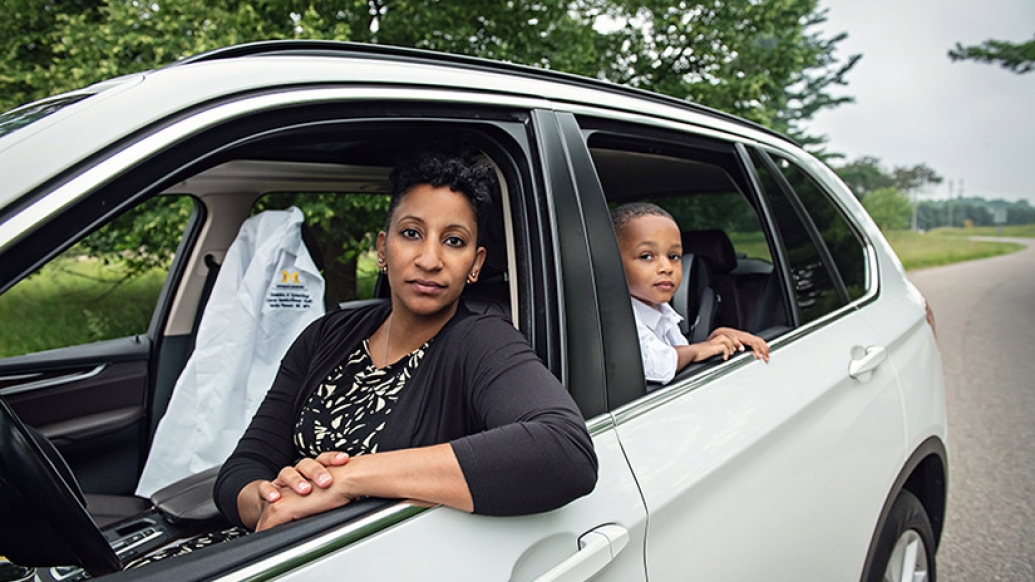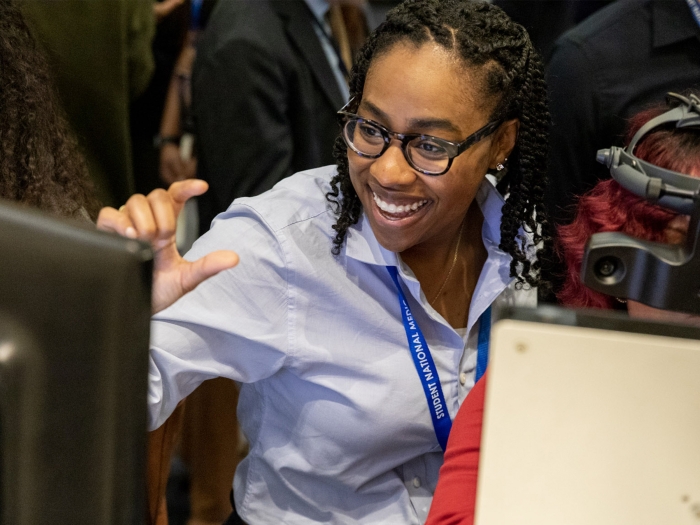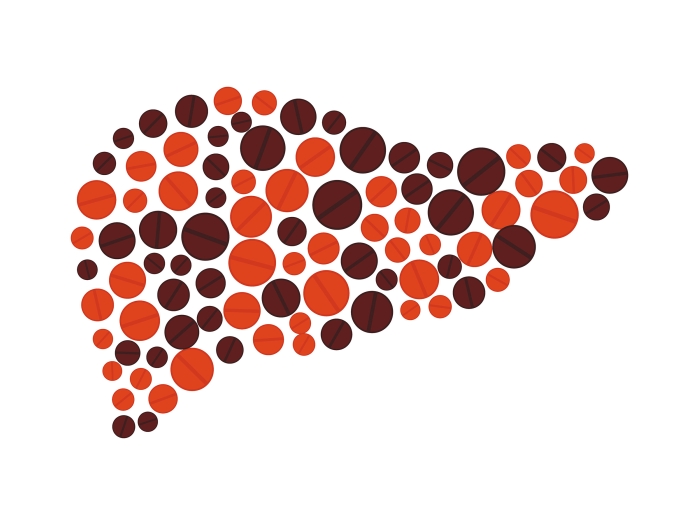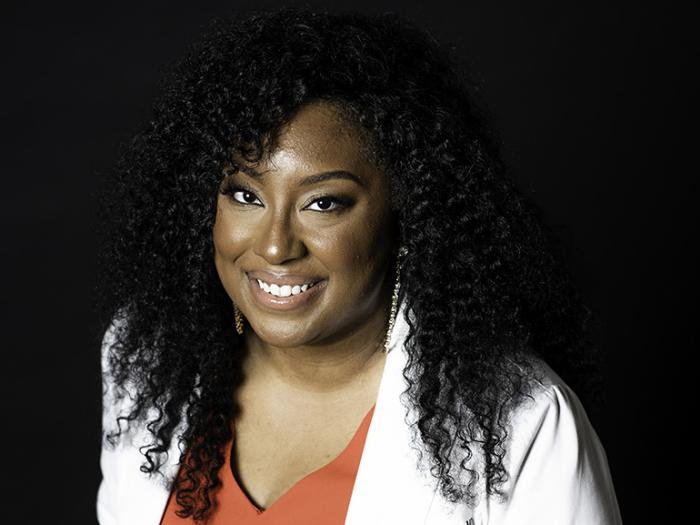
Editor's note: Versha Pleasant, M.D., MPH (Residency 2020), is a clinical assistant professor of obstetrics and gynecology who specializes in cancer genetics and breast health. Before entering medical school, Pleasant completed an HIV/AIDS Program Management Fellowship for the Centers for Disease Control and Prevention (CDC) in Rwanda and was later recruited to the CDC in Cote d'Ivoire to continue her work in HIV/AIDS among vulnerable populations. She completed her obstetrics and gynecology residency and cancer genetics fellowship at Michigan Medicine. She is deeply interested in health disparities, particularly in breast cancer and genetic testing barriers facing Black women. Pleasant wrote the following essay in summer 2020 in the aftermath of George Floyd's murder. She originally composed it as a letter to her son, who was 2 years old at the time.
I'm on the highway driving home from work at the hospital, and I'm Black. I'm wondering what could be the first to cause my asphyxiation: COVID-19 or the police.
I am an obstetrician/gynecologist who practically never wears her white coat. My day-to-day work involves gynecologic surgery, cesarean sections, and deliveries on our labor ward — none of which are at all conducive to maintaining its pristine, crisp white appearance. It would immediately meet the insult of blood, amniotic fluid, and the like, thereby rendering its upkeep entirely too time intensive for a resident. However, my white coat still goes with me wherever I go.
As I'm driving home, I am thinking of George Floyd, Breonna Taylor, Ahmaud Arbery, Emmitt Till, Trayvon Martin, Eric Garner, my Black husband, my Black son. I'm enraged, overwhelmed, tired, frustrated, scared, anxious. I glance over at the passenger seat. My white coat sits next to me like a bored commuter, never leaving the car, not having moved very much from its spot for the past four years of my training. It hangs not on the back of the seat, but rather, in reverse, draped over the front of the seat. Its lapel with my name and degrees are visible to whomever may happen to be looking into the driver seat window and needs some quick reassurance that I am not a threat. Perhaps it will matter when I need it to. Perhaps it will save my life. Or maybe it will do nothing. Maybe my permanent driving companion will offer no protection on a day when, for whatever reason, my black skin becomes too offensive for me to continue to live.
Earlier that day, I was reflecting on the images I witnessed on TV while awaiting the start of my surgical case, as George Floyd's trachea becomes compressed under the knee of a Minnesota police officer. Eight minutes and 46 seconds. I had to turn away because I felt like I was going to throw up. I focused on my own breathing to suppress the salty taste in the back of my throat and pondered how long it would take to end my life with a knee on my neck. And if it takes eight minutes for a literal knee on the neck to end a life, how long would it take a figurative knee to have detrimental consequences on a person's existence? Can a "knee on a neck" disguise itself as an opportunity denied, another pass up for a promotion, a medical diagnosis overlooked or undertreated? We decided to go another direction … This is not a good fit for you… We don't take students from that neighborhood at this school … Each represents a stifling and suffocation of hope and possibility.
I remind myself of the popular COVID-19 phrase — "we are all in this together" — which now only feels like smoke and mirrors. When I see George Floyd pleading for help, I am acutely aware of the two separate realities in which we live in America. Blacks are dying from COVID-19, and Blacks have been dying from racism. There is always a knee on our necks. It is just that some you can visually capture on a smartphone and others you cannot.
I can feel the tears well up in my eyes, and I try not to cry in order to see the road clearly. My mind wanders to my Black son. His caramel complexion, deep dimples, curly afro, and enthusiasm for life consistently attract passersby of all ages and backgrounds. Your son is so handsome! What a precious boy…. He is so cute! One day, an elderly white woman approached him and couldn't help but grab his arms and hands in sheer joy. I remember wondering at what point would she begin seeing my cute, adorable son as intimidating, aggressive, threatening? When would the transition occur, when she crosses the street as she sees him approaching, when she pulls her purse closer when he walks by, when she calls the police because he looks suspicious? When will I be the crying mother on TV?
I cannot hold it in anymore, and the tears fall. My field of vision blurs for a few moments. In the background, my audio playlist blares Tupac Shakur's rendition of the 80s song by Bruce Hornsby and the Range. I see no changes … All I see is racist faces … That's just the way it is … Some things will never change … The irony of the lyrics is piercing. I've listened to this song hundreds of times, but the words have now become overwhelming and linger in the air like an ominous prediction.
I reflect on the duality in which I live. When asked what I do for a living, I am reluctant to tell strangers that I am a doctor. The immediate response of white people is usually shock, as I witness their perceptions about me dramatically change in real time. The expression on their faces immediately softens and they give a silent sigh of relief that says: Ok, we're safe … I am now acceptable. What I want to tell them is that my social worth preceded my recitation of the Hippocratic oath; it began — just like everyone else's — the moment I was born.
And yet, my white coat sits with me in the car as my permanent chaperone. I hate that it's there. I hate what it represents. But I remind myself that it hangs in the passenger seat not because I need it every day, but because, one day, I may need it.




